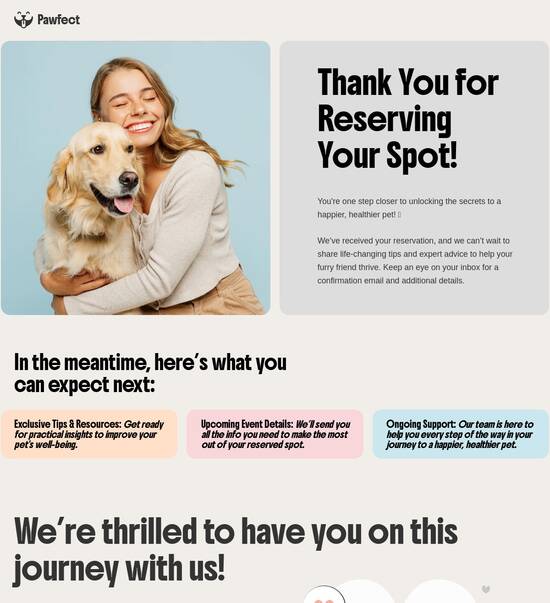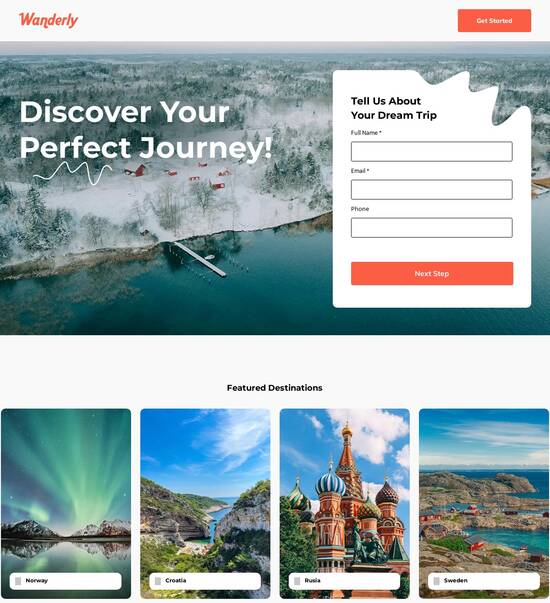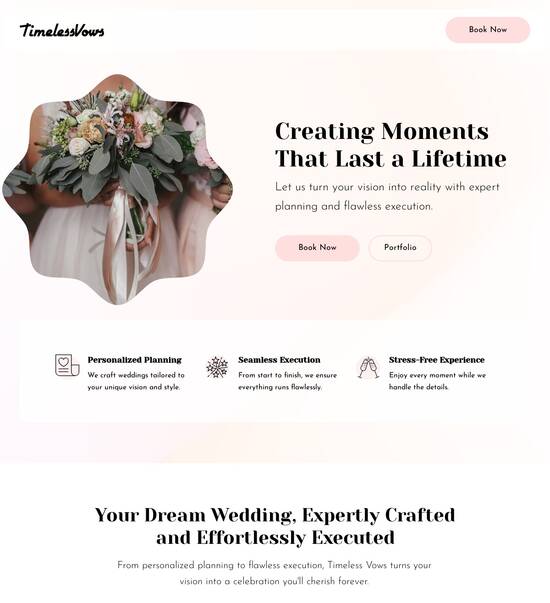
Web page template with interactive image gallery pop-up
Explore Similar TemplatesAbout template
Use web page templates with interactive image gallery pop-up and make your communications easy and transparent. Try our solution today.
Recommended templates

Easy to build without coding
With the intuitive drag-and-drop builder, anyone on your team can create high-converting pages without any knowledge of code or design. Make enhancements to your landing page with custom widgets using Javascript, HTML/CSS, or third-party scripts.

Multiple layouts for any industry and goal
Select from 500+ landing page layouts built to boost conversions across industry-specific scenarios. Customize them by adjusting fonts, adding images, and generating on-brand content with the AI assistant. Quickly scale with Instablocks® and Global Blocks that you can save, reuse, and update globally.

Loads fast and looks polished on any device
Every template is responsive, which means they present professionally on any device and load blazingly fast with our Thor Render Engine. You can also power them up with Google AMP technology to deliver an unparalleled mobile experience and drive higher conversions.

Robust analytics & experimentation
Get real-time updates and reporting across all your devices, showing the number of visitors, conversions, cost-per-visitor, and cost-per-lead. Launch AI-powered experiments, run A/B tests, and use heatmaps to analyze user behavior, then optimize your landing page to maximize conversions.







Easy to build without coding
With the intuitive drag-and-drop builder, anyone on your team can create high-converting pages without any knowledge of code or design. Make enhancements to your landing page with custom widgets using Javascript, HTML/CSS, or third-party scripts.
Multiple layouts for any industry and goal
Select from 500+ landing page layouts built to boost conversions across industry-specific scenarios. Customize them by adjusting fonts, adding images, and generating on-brand content with the AI assistant. Quickly scale with Instablocks® and Global Blocks that you can save, reuse, and update globally.
Loads fast and looks polished on any device
Every template is responsive, which means they present professionally on any device and load blazingly fast with our Thor Render Engine.
Robust analytics & experimentation
Get real-time updates and reporting across all your devices, showing the number of visitors, conversions, cost-per-visitor, and cost-per-lead. Launch AI-powered experiments, run A/B tests, and use heatmaps to analyze user behavior, then optimize your landing page to maximize conversions.
All the features you need to build photo gallery web template
Explore more featuresLearn how to build best photo gallery website template
Frequently asked questions about photo gallery template for website
Leading the way in building high-performing landing pages





Image gallery website template free: Your ultimate how-to guide
In the competitive world of digital marketing, leveraging an effective landing page can significantly impact your campaign's success. Instapage provides marketers with an intuitive platform tailored for creating high-converting landing pages that maximize ROI. This step-by-step guide will walk you through maximizing your use of Instapage to create optimized landing pages, while the accompanying FAQ will address common queries.
Why choose Instapage for landing page creation?
Instapage stands out with its robust features that empower marketers to accelerate conversions and improve their digital marketing strategy. The all-in-one platform offers diverse templates, real-time collaboration tools, and built-in optimization features that help marketers operate efficiently and effectively.
- 100+ high-converting templates: Choose from a library of customizable templates that cater to various industries and goals, enabling quicker launch times and better overall performance.
- Dynamic content personalization: Instapage allows for personalized experiences, improving user engagement and conversion rates by aligning specific ads with tailored landing pages.
- Built-in optimization features: Detailed analytics dashboards, A/B testing capabilities, and heatmaps enable marketers to analyze page performance, iteratively improving conversion rates.
Getting started with Instapage
To effectively utilize Instapage for your landing pages, follow these essential steps:
- Choose a template: Start by selecting from Instapage's wide range of templates that suit your marketing campaign's specific needs, whether it's for lead generation, product promotion, or event registration.
- Customize your landing page: Use the intuitive drag-and-drop editor to personalize elements like images, text, and forms to resonate with your target audience, enhancing your page's appeal.
- Integrate with your marketing stack: Leverage integration options with CRM, email marketing, and analytics tools to maintain a streamlined workflow and consolidate your marketing data.
Best practices for optimizing landing pages
Implementing effective optimization strategies can significantly enhance the performance of your landing pages. Focus on these key elements:
- Conduct A/B testing: Experiment with different headlines, layouts, and calls to action (CTAs) to determine what resonates best with your audience, driving higher conversions.
- Utilize detailed analytics: Regularly track performance metrics such as bounce rate, conversion rate, and average time on page to identify areas needing improvement.
- Incorporate feedback: Act on insights gathered from user interactions and drop-off rates to refine your landing page content and layout continuously.
With these steps, creating and optimizing landing pages becomes a structured and effective process through Instapage.
As you implement these strategies, remember that consistent monitoring and updating of your landing pages are vital for ongoing success.
Explore the power of Instapage and start transforming your digital marketing campaigns today! By leveraging tools that optimize your landing pages, you can achieve substantial improvements in your overall ROI.
People also ask about photo gallery html template free download
The visual power of interactive image galleries in web page templates
Setting the stage: The importance of visual content
Visual content plays a pivotal role in capturing users' attention and fostering engagement on any website. The average visitor spends a mere 15 seconds on a page before deciding whether to stay or leave. This statistic underscores the demand for impactful visuals that can resonate with users quickly. A well-structured interactive image gallery can serve as a dynamic centerpiece, enhancing the overall user experience and retention.
Statistics indicate that websites with engaging visuals can see conversion rates rise significantly. For instance, a survey by HubSpot states that content with relevant images gets 94% more views than text-only content. Using interactive elements, such as galleries, further amplifies this effect by allowing users not only to view images but also to engage directly with the content. This interactivity is essential in modern web design.
Understanding photo gallery design
The design of a photo gallery encompasses several components that ensure it is both visually appealing and user-friendly. Key elements include layout, navigation, and image quality. An effective gallery should allow users to easily browse through images without confusion or extensive scrolling. Different design formats like grid, masonry, and carousel layouts serve distinct purposes, with each having unique strengths.
Grid Layout: A standard approach, ideal for displaying a consistent number of images in rows and columns.
Masonry Layout: Offers a more organic look, accommodating images of varying sizes without leaving empty spaces.
Carousel Layout: Adds interactivity by allowing users to navigate through images one at a time.
Choosing the right design is imperative, as it balances aesthetic appeal with functional usability. The selected layout should complement the overall theme of the website and enhance the message you aim to convey to your audience.
Crafting the interactive image gallery
Creating an interactive image gallery begins with a solid HTML framework. Utilizing semantic HTML is crucial, as it enhances accessibility, ensuring screen readers can effectively interpret the gallery. The structure typically includes a main gallery container, individual image elements, and accompanying captions or descriptions.
HTML: Use elements for grouping images and ensure tags contain alt text for better accessibility.
CSS: Focus on styling to make galleries visually striking while being mindful of responsiveness.
JavaScript: Facilitate interactivity through event listeners for opening and closing images.
Next, CSS comes into play. Leveraging techniques such as CSS Grid and Flexbox allows for a responsive design that ensures your gallery looks spectacular on any device. It's important to implement media queries to adapt the layout depending on the screen size, ensuring a seamless user experience.
Enhancing user experience with pop-up features
Incorporating pop-up features into your image gallery significantly enhances the user experience. Pop-ups provide visitors with an immersive viewing opportunity while minimizing distractions from the surrounding content. This type of feature can lead to higher engagement rates as users are captivated by the larger view of images.
However, accessible design is key. Properly implementing alt text and ARIA roles ensures that all users, including those utilizing assistive technologies, can fully enjoy the gallery. By doing this, you minimize potential accessibility violations.
Lightbox: A popular library for implementing pop-up images that gives users a fullscreen viewing experience.
Fancybox: Another reliable option known for its ease of use and robust features.
Custom Solutions: Coding your own pop-up functionality to achieve a tailored design.
Additionally, JavaScript bolsters interactivity within pop-ups. By utilizing simple event handling techniques, you can control when to open or close the pop-up, along with other effects such as fading transitions. This not only improves aesthetics but also user satisfaction.
Integrating links and actionable elements
An effective image gallery is not just for visuals; it can also serve as a significant gateway for directing users to relevant content. By strategically integrating links within the images, you create a route for visitors to explore products, services, or further informational resources seamlessly.
It's crucial to strike a balance, ensuring that the gallery remains engaging without overwhelming the user with too many links. Consider using click-through overlays or pop-ups that invite users to explore further, like viewing product details or access service pages.
Image links: Each image can be linked to a relevant page or product.
CTA overlays: Encouraging users to take action without impeding their browsing experience.
Dynamic elements: Using dynamic text replacement based on user behavior for personalized experiences.
Employing strategic elements while maintaining a clean user interface ensures maximum engagement, making a memorable experience for visitors.
Optimizing for accessibility and SEO
Accessibility is a vital aspect of web development, especially for image galleries. Recognizing common pitfalls, such as lack of alt attributes, can impede inclusivity. Implementing alt text not only provides clarity for users with visual impairments but also positively impacts SEO efforts.
Alt Attributes: Essential for enhancing accessibility and conveying the purpose of images to search engines.
Keyboard Navigation: Ensure users can navigate through images using keyboard shortcuts.
SEO Practices: Optimize image file names, include captions, and utilize structured data to enhance discoverability.
Combining accessibility practices with SEO strategies will not only make your image gallery more user-friendly but also enhance its visibility in search engine results, attracting a broader audience.
Exploring advanced customization techniques
Advanced customization techniques allow you to tailor the image gallery to align closely with your overall brand identity. By leveraging CSS variables and custom properties, you can develop a cohesive style that reflects your brand's aesthetics.
CSS Variables: Simplify your code and enable easy style changes that apply across the gallery.
Visual Modifications: Use CSS classes to implement hover effects, transitions, or animations.
Demo Galleries: Explore various designs and templates for inspiration on unique implementations.
Investment in customization not only enhances user experience but also ensures your website reflects the uniqueness of your brand, making it more memorable to visitors.
The future of image galleries in web development
As technology continues to evolve, so will the capabilities of image galleries. Anticipated trends indicate a shift towards even more interactive and immersive experiences. The integration of artificial and virtual reality elements may soon become standard, providing users with a deeper connection to the visuals.
The evolution of user interaction will likely transform static images into experiences that allow users to engage with content beyond mere observation. Tracking behavioral responses in real-time may also drive the development of personalized galleries that respond to individual preferences.
Case studies: Successful implementations
Real-world examples demonstrate the power of interactive galleries. Websites that incorporate visually appealing galleries often see enhanced user engagement. Analyzing successful case studies reveals common themes, such as the use of stunning imagery paired with seamless navigation.
A beauty brand showcased their products through an interactive gallery, increasing online purchases by 30%.
An educational institution used a gallery to display campus life, resulting in a 25% rise in student inquiries.
A travel website saw a 40% spike in engagement when utilizing immersive image galleries to share user experiences.
These case studies highlight that when designed thoughtfully, interactive image galleries can significantly impact conversion metrics, driving engagement and fostering community among users.
Conclusion: Elevating landing pages with image gallery features
In conclusion, creating an interactive image gallery is a powerful way to enhance landing pages. The benefits extend beyond visuals, potentially transforming user experience, accessibility, and SEO performance. These features are crucial in driving conversions and building brand credibility.
As the digital landscape continues to evolve, staying ahead of design trends is vital. Marketers and web developers alike must adopt innovative strategies to ensure their websites remain relevant and engaging to users. Investing in interactive galleries not only improves user experience but also aligns closely with the objectives of reducing costs, boosting conversions, and delivering targeted landing page experiences.
Ready to skyrocket conversions?
Supercharge your ad campaigns with high-performing landing pages
Get started














